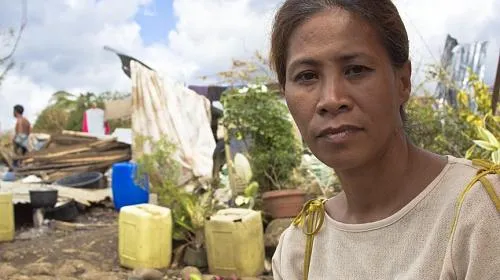CARE emphasizes the importance of engaging women and girls in the planning and delivery of crisis assistance
ISTANBUL—(May 22, 2016) — As the world’s first-ever humanitarian summit convenes in Istanbul May 23-24, CARE stresses the importance of accounting for gender differences when planning for and responding to emergencies. Women and girls are particularly vulnerable during crises and have different needs and challenges from men and boys. Women and children are 14 times more likely to die in a natural disaster than men. Sixty percent of all maternal deaths take place in humanitarian crises, and all forms of gender-based violence against women and girls spike during disasters and conflict.
“Women and girls are disproportionately affected by emergencies, and so it is vital that we elevate their voices above the crisis and make the safety and dignity of women and girls a focus of our emergency response,” said Michelle Nunn, CARE president and CEO. “While progress has been made in this regard, we still have a long way to go before ensuring that the prevention of sexual violence and maternal deaths are considered alongside the delivery of food, water and shelter as essential dimensions of emergency response.”
In order to highlight this issue on the World Humanitarian Summit agenda, CARE is co-hosting a side event May 23 — along with UN Women, Oxfam Canada and ActionAid — that addresses both the barriers and the opportunities women face as they build resilience for themselves, their families and their communities.
“Our work has shown us that when we meaningfully engage women, when we directly address their needs, our humanitarian efforts are more efficient and more effective. That not only accelerates the transition to recovery, but it also builds resilience within the larger community,” said Nunn.
A CARE report titled Empowering Women and Girls Affected by Crisis found that, despite the clear benefits of engaging women and girls – and the broad consensus around doing so – those voices struggle to be heard, and women are not given sufficient opportunity to make decisions that could save themselves and their communities during disasters. In 2014, only 1 percent of all funding in fragile states went to women’s groups.
A leading humanitarian organization, CARE has made a number of specific, concrete commitments at the World Humanitarian Summit in order to position women at the forefront of emergency response — as recipients of aid, but also as change makers and leaders of the process. CARE will:
Scale-up partnerships with women-led organizations on humanitarian assistance and protection, disaster risk reduction, climate change resilience and adaptation and recovery programs in Syria, Pakistan, Nepal and Niger.
Partner with women’s organizations in our core sectors (shelter, water and sanitation; sexual, reproductive and maternal health; and food security) in order to enhance efforts to define and implement minimum standards on gender in these sectors.
Triple our funding to women’s groups by 2020.
Make sure all emergency preparations, programs and monitoring account for the specific needs of men, women, boys and girls and enforce guidelines and standards around them.
Media contact:
Nicole Harris, nharris@care.org, 404-735-0871
About CARE:
Founded in 1945, CARE is a leading humanitarian organization fighting global poverty. CARE has more than six decades of experience helping people prepare for disasters, providing lifesaving assistance when a crisis hits, and helping communities recover after the emergency has passed. CARE places special focus on women and children, who are often disproportionately affected by disasters. To learn more, visit www.care.org.

